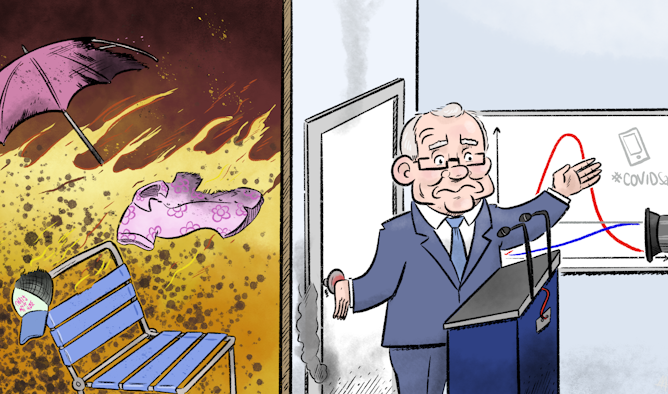|
|
|
Editor's note
|
|
Before the coronavirus pandemic struck, probably few of us would have had a clear conception of what good political leadership in a global health crisis might look like. Frank Bongiorno writes that, as this summer drew to a close, many of us would have had some fairly firm ideas of what leadership in a bushfire crisis should not look like – going on an overseas holiday at a critical time, for example, or forcing traumatised people to shake
hands. Prime Minister Scott Morrison argued at the time it was not his job to “hold a hose”. But sometimes, Bongiorno argues, it is.
As prime ministers, James Scullin and John Curtin had to do just that; the former during the Great Depression; the latter in the second world war. After a disastrous handling of the bushfires, Morrison has shown himself to be an adaptable leader. But how he deals with the immense task of rebuilding the economy in the wake of pandemic may well be more challenging to his leadership than anything so far.
P.S. We rely on reader donations and this year, more than ever, every gift makes a difference. A donation to The Conversation is an investment in experts. If you’re able, please support us, and a heartfelt thanks if you already have.
|
Amanda Dunn
Section Editor: Politics + Society
|

|
|
Top stories
|

Wes Mountain/The Conversation
Frank Bongiorno, Australian National University
After a disastrous performance during the summer's bushfires, Morrison has been a stronger leader on the global health crisis. But another great challenge – the economic one – is still ahead.
|

SCOTT BARBOUR/AAP
Katie Attwell, University of Western Australia
Do recent lock-down protests indicate that Australia is on the path to Trump's America? While we can currently rest easy, the problem requires careful consideration.
|

Shutterstock
Ray Markey, Macquarie University
The National Tertiary Education Union has agreed to a deal with universities that aims to save at least 12,000 jobs. But universities aren't obliged to sign up.
|

Brett Wilks
Devi Veytia, University of Tasmania; Stuart Corney, University of Tasmania
Climate change is changing Antarctic krill habitat. The repercussions for the Southern Ocean food web are huge.
|
Science + Technology
|
-
Dinesh Kumar, RMIT University; Pj Radcliffe, RMIT University
COVIDSafe uses Bluetooth radio waves. These can only measure how physically close two people are, but not if those people are in the same room, or even in different cars passing each other.
-
Scott Hocknull, University of Melbourne; Anthony Dosseto, University of Wollongong; Gilbert Price, The University of Queensland; Lee Arnold, University of Adelaide; Patrick Moss, The University of Queensland; Renaud Joannes-Boyau, Southern Cross University
These megafauna were the largest land animals to live in Australia since the time of the dinosaurs.
|
|
Environment + Energy
|
-
Justine Bell-James, The University of Queensland
Queensland's new human rights act has opened the door for a flood of climate change litigation.
|
|
Business + Economy
|
-
Richard Denniss, Crawford School of Public Policy, Australian National University
Decisions about the spending of enormous amounts are about to be made quickly. Here are eight rules to determine value for money.
-
Helena Steel, Swinburne University of Technology; Bernadine Van Gramberg; Santina Bertone, CQUniversity Australia
Interviews with Ansett Airlines employees ten years after the airline’s collapse reveals a workforce much more resilient than expected - thanks mostly to how much staff helped each other.
-
Melissa A. Wheeler, Swinburne University of Technology; Asanka Gunasekara, Swinburne University of Technology
The idea of work-life balance caught on the 1980s. The COVD-19 pandemic shows we need to replace it with a more integrated approach.
|
|
Cities
|
-
Philip Laird, University of Wollongong
Once again, the state looks intent on pressing ahead with a huge road project without releasing a business case. Among the many concerns is the failure to look at lower-emission alternatives.
|
|
Arts + Culture
|
-
Meng Xia, UNSW
Fang Fang publicly diarised the Wuhan lockdown in realtime. Now, her WeChat diaries are being published in English.
-
Victoria Duckett, Deakin University
Under lockdown, Cineteca Milano is releasing 20 archived films a week online. Why aren't we seeing this from our National Film and Sound Archive?
|
|
Health + Medicine
|
-
Pippa Blackburn, Griffith University; Donna McAuliffe, Griffith University; Lise Johns, Griffith University
Health-care professionals are tasked with a professional responsibility of responding to the health and well-being of the people for whom they care. But what about their well-being?
|
|
Politics + Society
|
-
Alexander Gillespie, University of Waikato
Fears of looming totalitarianism are unfounded, despite some valid concerns about new COVID-19 laws.
-
Michelle Grattan, University of Canberra
Bill Kelty, former secretary of the ACTU, has outlined a five-point plan for Australia to approach the return from the coronavirus downturn.
-
Adrian Beaumont, University of Melbourne
The prime minister's approval ratings and the two-party preferred vote come closer to alignment, while Donald Trump still faces an uphill battle in November if economic doldrums continue.
|
|
| |
Featured jobs
|
|
|
| |
| |
| |

|
| |
| |
| |
Featured Events & Courses
|

|
Level 21, 15 Broadway, Ultimo, New South Wales, 2007, Australia — University of Technology Sydney
|

|
Level 21, 15 Broadway, Ultimo, New South Wales, 2007, Australia — University of Technology Sydney
|

|
Online, Melbourne, Victoria, 3000, Australia — Australia New Zealand School of Government
|

|
Level 4, 40 City Road, Southbank, Victoria, 3006, Australia — Australian Institute of Family Studies
|
|
|
|
| |
| |
| |
| |
| |
|
|
|
|
|
|
|